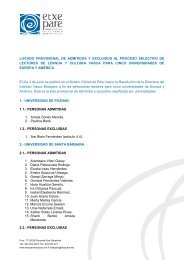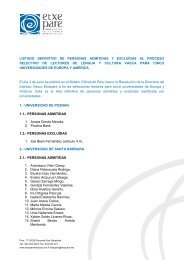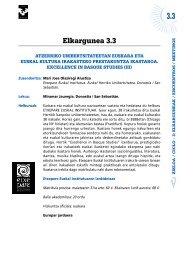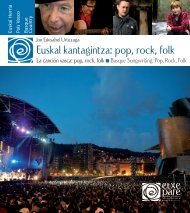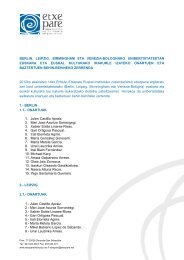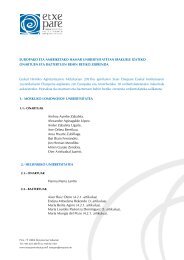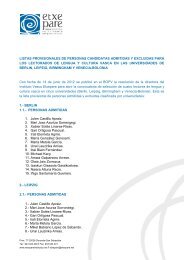Euskal sukaldaritzaz - Etxepare, Euskal Institutua
Euskal sukaldaritzaz - Etxepare, Euskal Institutua
Euskal sukaldaritzaz - Etxepare, Euskal Institutua
You also want an ePaper? Increase the reach of your titles
YUMPU automatically turns print PDFs into web optimized ePapers that Google loves.
casi todo el mundo lo hace en casa. Nos encanta, sobre<br />
todo en pleno verano, cuando la campaña de la<br />
pesca del atún está en su punto más álgido.<br />
Por cierto, y antes de dar paso a la receta, quiero<br />
contar que hace ya demasiados años, me tocó ser<br />
jurado en un Campeonato de <strong>Euskal</strong> Herria de marmitako.<br />
Se juntaron más de cien parejas de cocineros<br />
y cocineras concursando para ganar el premio. No recuerdo<br />
quien ganó, pero sí otra cosa. Todos los concursantes<br />
discutían fogosamente sobre la fórmula<br />
verdadera del “auténtico” marmitako: que si necesitaba<br />
tomate, o que no; que si quedaba mejor con un<br />
poco de picante y un poco de pimiento choricero, o<br />
que si eso era un auténtico sacrilegio… Y en ese plan.<br />
Cada maestrillo tenía allí su librillo y su canon. El<br />
“auténtico” era el de cada uno de ellos, no así el del<br />
prójimo. Increíble. Afortunadamente me tocó probar,<br />
como digo, más de una veintena de marmitakos<br />
y recuerdo que si uno estaba bueno, el otro también,<br />
y el otro, y el otro.<br />
Se necesita ser muy torpe para estropear este magnífico<br />
plato, que de por sí es muy sencillo como a su<br />
entidad de humilde caldereta corresponde. Basta con<br />
juntar los ingredientes que a uno gusten en el debido<br />
momento, y servir cuando cada uno de ellos está en su<br />
mejor punto: la patata, el atún y el caldo. Con tomate<br />
y sin tomate, con pimientos choriceros y sin ellos, picando<br />
o sin que pique. Sin dogmas y que esté bueno.<br />
Eso es lo principal. Hay, incluso quien dice, que antes<br />
de que llegara la patata de América, los pescadores la<br />
hacían a bordo con pan que se había quedado duro.<br />
Es un plato que adoro, idóneo para cuando somos<br />
muchos a la mesa. Tiene muchas virtudes, pues puede<br />
tenerse preparado antes de sentarse a comer, de<br />
manera que el cocinero también puede ser comensal.<br />
También puede utilizarse tanto como primer plato<br />
como de segundo. Práctico, económico, delicioso<br />
y muy representativo de nuestra manera de entender<br />
la cocina. He aquí la receta que hacemos en casa<br />
y que siempre da buen resultado.<br />
By the way, and before proceeding to the recipe,<br />
I would like to tell the story of how, by now too many<br />
years ago, I was chosen to be a judge for the Basque<br />
Country’s Marmitako Competition. Over a hundred<br />
couples took part in the contest, with a prize being<br />
awarded to the winning cooks. I don’t recall who won,<br />
but I do remember something else. All those taking<br />
part resolutely debated the best formula for an “authentic”<br />
marmitako: whether it required tomato or<br />
not; whether it was better with a little dried chilli or a<br />
little sweet dried red pepper, or whether this was true<br />
sacrilege... like this.<br />
Each little maestro taking part had their little book<br />
and their canon. Each of theirs was the “authentic”<br />
one; not that of their neighbours. Incredible. Fortunately,<br />
I had to taste, as I mentioned, more than<br />
twenty marmitakos and I remember that if one<br />
was good, so was the other, and the other, and the<br />
other.<br />
One would have to be especially inept to ruin this<br />
magnificent dish, that is, in itself, as simple as befits<br />
a humble fish stew. One merely has to add the<br />
ingredients one likes at a particular moment, and<br />
serve it when each of these has been cooked to perfection:<br />
potatoes, tuna, and stock. With or without<br />
tomato, with or without red pepper, whether hot or<br />
sweet. Without any dogma and so long as it is good.<br />
This is the main thing. There are even those that<br />
say before the potato arrived from the Americas,<br />
fishermen made it aboard their vessels with hard<br />
stale bread.<br />
It I a dish I adore, suitable for when there are a lot of<br />
us around the table. It has many advantages, since<br />
it can be made ahead of time, allowing the cook to<br />
become a fellow diner. It can also be a starter or a<br />
main dish. Practical, economic, delicious and very<br />
representative of our way of interpreting cooking.<br />
Here is the recipe we follow at home and that is always<br />
successful.<br />
15



